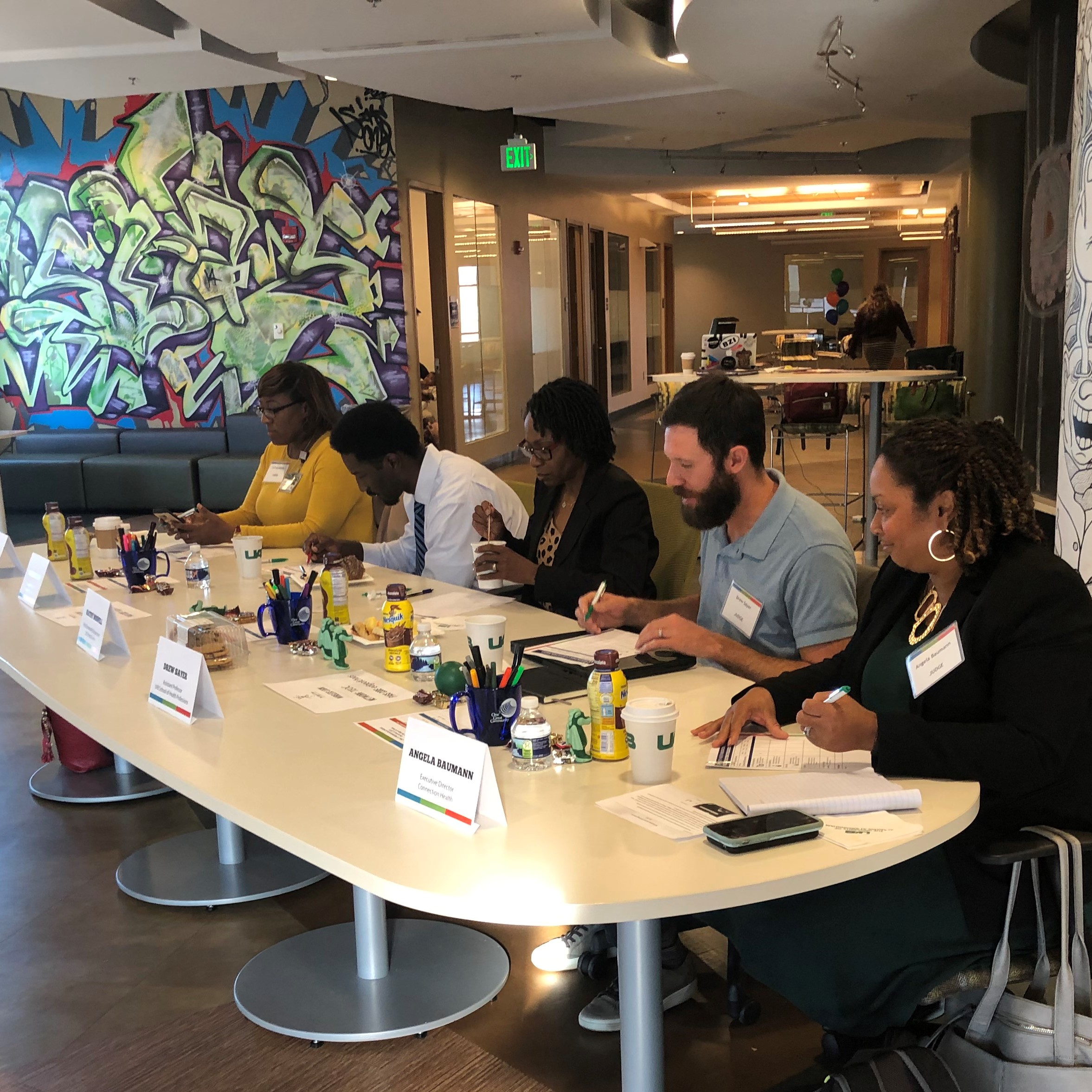Upcoming CCTS Events
CHIA (Community Health Innovation Award) encourages 501(c)(3) organizations to think boldly and creatively about solutions to health challenges our communities face. The 2019 grantees participated in a rigorous 10-week process that culminated in final presentations to a panel of judges on Thursday, December 5th.
The process began with 17 applicants who attended a mandatory innovation workshop to refine project ideas, then submitted proposals that were reviewed against the funding criteria. Next, applicants were connected to mentors for expert advice. Five applicants made it through the process entirely, securing a total of $55,000 in program and project funding.
Here are the  2019 CHIA Grantees:
2019 CHIA Grantees:
• Gasp is a health advocacy organization with a mission to advance healthy air and environmental justice in Birmingham. Award: $5,000
• Girlz Talk United provides mentoring, young adult leadership, parent involvement and sports, all as part of its mission to continue to empower and inspire the community. Award: $7,500
• Link and Lease/Druid Hills Alliance exists to create a Birmingham where everyone has a place they can call home by working with housing insecure individuals who deserve an opportunity for fair housing. Award: $11,000
• Offender Alumni Association is dedicated to its mission to empower former offenders and their family members to actively engage in reducing crime and restoring communities. Award: $11,500
• Chocolate Milk Mommies is a parenting group working to remove the stigma surrounding breast-feeding—especially in public—in black communities. Award: $20,000
The recipients will be celebrated at an awards reception on Tuesday, December 17th. Visit our CHIA page to learn more about the program and to keep in touch with the progress of these awardees.
Each year, the CCTS External Advisory Committee gathers at the CCTS “Hub” to learn more about activities across the partner network, as their guidance plays a vital role in shaping strategy for the coming year.
On Tuesday, December 3rd, EAC members, along with CCTS site leads, leadership and support staff, assembled on UAB’s campus with the charge of receiving updates on CCTS activities and progress, discussing strategies for meeting the CCTS’ mission, and to examine specific tactics in moving forward with that mission. Each member of the EAC provides specific expertise that benefits each of the center’s domains. The members of the CCTS External Advisory Committee are:
Alan Brasier, MD (link), University of Wisconsin, Madison
Daniel Ford, MD, MPH (link), Johns Hopkins School of Medicine
Paul Harris, PhD (link), Vanderbilt University
Katherine E. Hartmann, MD, PhD (link), Vanderbilt University
Sundeep Khosla, MD (link), Mayo Clinic
Susan Perkins, PhD (link), Indiana University
The meeting consisted of several formal presentations on the past year’s progress and sparked meaningful discussion that will continue into the coming weeks.
The committee will develop a summary of feedback that the Center will utilize in strategic planning moving forward. The day concluded with CCTS Director Dr. Robert Kimberly’s sincere gratitude for all who traveled near and far to further the goals of the CCTS in 2020.


The Morris F. Collen Award of Excellence is presented to an individual whose personal commitment and dedication to medical informatics have made a lasting impression on the field. James Cimino, M.D., was named the 2019 recipient of the prestigious award. Dr. Cimino is the Director of the Informatics Institute at UAB and Co-Director of the CCTS.

The Morris F. Collen Award of Excellence is named in honor of Morris F. Collen, a pioneer in the field of medical informatics. The recipient is selected by the American College of Medical Informatics’ Awards Committee. “The Morris F. Collen Award is awarded only to the most distinguished informaticians,” said ACMI President William M. Tierney, M.D. “ACMI is honored to recognize Dr. Cimino for his substantial accomplishments in the field of biomedical informatics. Dr. Cimino has created incredibly useful and impactful tools for health care providers like me to use every day in providing high-quality care. His dedication and passion for improving patient care are truly inspiring.”
Listen as other informatics experts honor Dr. Cimino’s contributions through this video that was shown at the awards presentation.
After investigators run queries with i2b2 and receive the patient count or defined a cohort they desire, they often lean on EDW analysts to help them acquire deeper-level information. Take Hannah Eckenrode, for example, researcher at UAB: “With this first step (i2b2), I was able to determine I had the population at UAB, but when I wanted to get more details, like date of diagnosis or medication start date, an analyst was able to pull the more complicated information that I was looking for.”
The analyst that assisted Eckenrode was Dale Johnson, one of 5 EDW analysts on the research team. Johnson provides this example of the wider breadth of data the EDW includes: “Sometimes investigators need to know the data in a temporal sequential setting—how many people have my disease and have a lab value below a certain level and did that lab value increase after the patient received medication? Or someone may want to chart a patient’s progress over time.” Whatever the need may be, the analyst writes those complicated queries and creates data tables that offer convenience for the researcher(s). Johnson shared, “We can place the data in the exact format for how someone wants it, and they can easily extract whatever they need.” The process can take several days, but oftentimes only requires a day.
Fast Facts about EDW:
Provides the ability to: Query inpatient and outpatient data on a near real-time basis (24 hours after occurrence), perform queries with easy to use drag and drop of data objects, format and graphically present a data set or report, schedule reports and deliver to preferred email inbox, view and analyze data from different perspectives, and export a data set in multiple formats for further analysis.
Data inclusion: The EDW includes most everything in the Electronic Health Record (IMPACT). This includes visit information, ICD diagnoses, ICD and CPT procedures, medications orders/administrations/dispensing, laboratory orders and results, ICD Problems lists, allergies, immunizations, histories (medical, surgical, social, smoking, pertinent negative medical), notes, vitals and other observations (flow sheet data), OB / Pregnancy and Maternity details. With IRB approval and validation, additional data can be provided.
Additional data access: The analyst is not limited to IMPACT EHR data. They also have access to the tumor registry, OnCore data and data sets made available by other UAB departments. The team has also taken steps to integrate information on census tract, social determinants of health, area deprivation indices and other geographic-related information to enable population-based research of health disparities.
Interested in connecting with an EDW analyst? Start by sending an email to
Dana Rizk, MD, has been named the Medical Director for UAB’s Clinical Trials Administrative Office (CTAO). The CTAO oversees the various policies, procedures, systems, and initiatives supporting the clinical trials conducted at UAB. Read on to learn more about her background in clinical research, and why she’s excited for what’s to come.

I am a Professor of Medicine in the Division of Nephrology at the University of Alabama at Birmingham. I completed my residency, chief residency and fellowship at Emory University Hospital and joined UAB in 2008.
My exposure to clinical research started during my fellowship and I fell in love with this career path. However, beyond the science, clinical research opened my eyes to patients, families and volunteers’ dedication and commitment to the advancement of science. My current clinical and research interests revolve around glomerular diseases and, in particular IgA Nephropathy (IgAN). I am the principal investigator of several clinical trials and am part of multi-disciplinary translational research projects focused on the pathogenesis of IgAN and the role of biomarkers.
Four years ago, as Director of Clinical Trials Research in the Division of Nephrology I set out to re-organize the infrastructure and teamwork behind our clinical trials. My goal was to have clinical trials accessible to patients. I also wanted to streamline the submission and budget negotiation process to make it more efficient and successful. In doing so, I was hoping to engage junior investigators and trainees and build our future ambassadors in clinical research.
I am looking forward to working together to continue to make UAB a premier destination for clinical trials research!
